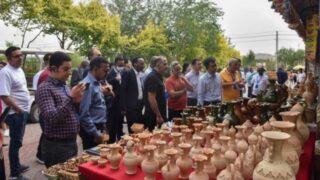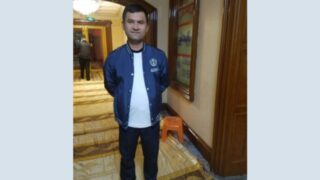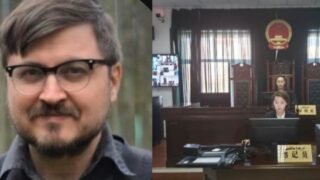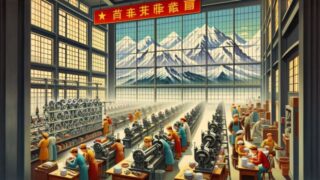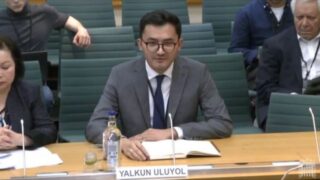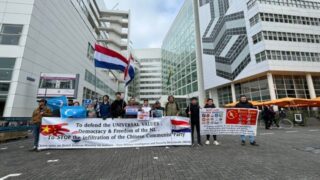Pressure is mounting to release Uyghur asylum seekers from horrific conditions in Thailand. Southern Mongolian and Christian refugees from China also face problems.
by Ruth Ingram
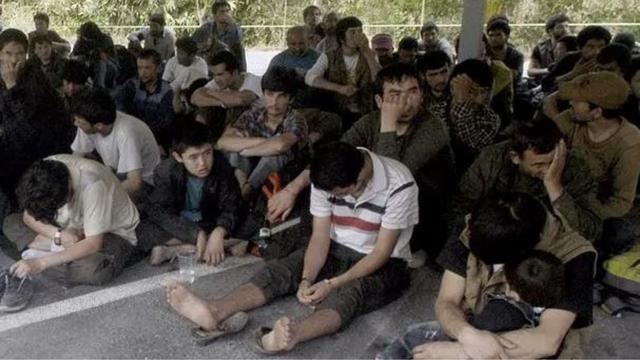

Following a recent exposé in the Bangkok Post concerning the plight of Uyghur refugees held captive in Thai detention centers, Lord David Alton, a UK peer who has visited such a detention facility in Thailand, speaking to Bitter Winter, has denounced the “heartbreaking” incarceration, where inmates are “caged like animals.” He has appealed to the British government to expedite their transfer to Britain, and to the UNHCR to examine their cases as a matter of urgency.
Following their arrival in Thailand in 2014 after a torturous overland route through inner China, Laos, and Cambodia, lasting for many months, a group of 173 were freed and sent on to Turkey in late June 2015, but almost immediately a further 109 were repatriated to an uncertain fate back in the homeland. Hope for a positive outcome on their return faded quickly following Global Times footage of the hooded men being manhandled down an airplane staircase and reports that they were being investigated for terrorism-related crimes. None has been heard from since. From the original total, 59 have been living in an uncertain limbo for the last eight years and their fate is no closer to a denouement.
Some justification for bowing to China and tarring all Uyghurs with Beijing’s “terrorism” narrative, arose from the August 2015 bombing of the Erawan Shrine at Ratchaprasong Intersection, one of Bangkok’s busiest downtown areas. Two Uyghurs were accused of the attack, which killed 20 people and injured 130. Despite their claims of innocence and assertion that confessions were obtained under torture, the hearings have dragged on painfully slowly and their detention continues to the present day. They have been kept incommunicado at the Lak Si temporary prison where their conditions are abject, and they have no contact with the outside world.
The other 59 Uyghurs, some women and children, have been moved from pillar to post over the years. Despite eight Thai human rights organizations pushing for a solution, it seems they are pawns in a diplomatic quagmire between China and the United States; Beijing currently seeming to have the upper hand. More than a dozen Thai rights groups led by the People’s Empowerment Foundation, fearing a precipitated repatriation of the group, handed a petition to the Foreign Affairs Committee of parliament’s lower house on June 15th this year calling for its help to step in and prevent their return. The results of their plea are still pending.
Thai government response to refugees seeking sanctuary has been sketchy over the years and strongly condemned by Human Rights Watch (HRW). According to the group, Thai authorities have “repeatedly violated the international principle against refoulement.” Ignoring an international outcry and protests by the UNHCR and UN Secretary-general, 4,500 Hmong were repatriated to Laos in December 2009, thousands of Burmese fleeing armed conflict were sent back to Burma and 128 Tamils arrested for illegal entry.
A recent case that has largely flown under the radar is that of Southern Mongolian activist Adiyaa, aka Wu Guoxing, who after fleeing Mongolia to Thailand with seven members of his family, and despite obtaining UNHCR refugee status, was detained and forced to meet Chinese embassy officials on October 5, 2022, under the pretext of having broken “Chinese relevant laws.” He was told to sign papers admitting his guilt and agreeing to return to China, which he refused to do.
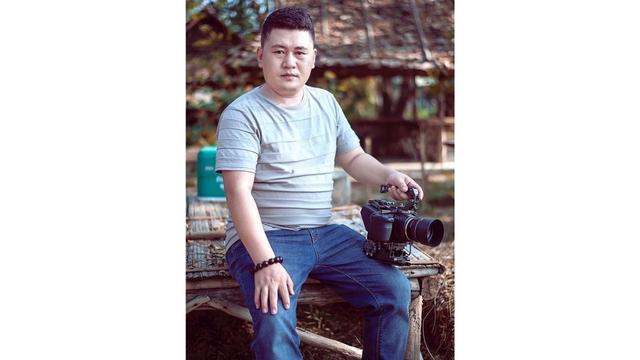

Having opened a Mongolian language training center in Hohhot, his participation in protests over CCP plans to erase the Mongolian language resulted in the closure of his facility and harassment of his family. They were forced to leave but all thoughts that they were safe on reaching Thailand were quickly dispelled once they realized that Beijing had them in its sights, and Thailand had no intention of offering the protection they were legally entitled to.
Despite being held in a Thai government detention center, four Chinese State security agents were given free rein to set upon him, and beat him until eventually he gave in and signed the papers the agents had prepared. He and his family members are terrified they might be deported at any moment. UNHCR officials have visited him in captivity, but his sister Turgowaa reported to the Southern Mongolian Human Rights Information Centre, that he was still detained. “It is all too clear that the Thai Immigration Bureau is ganging up with the Chinese State Security authorities, disregarding the United Nations conventions on refugees and human rights,” she said.
Chinese Christians too, on the run from intolerable persecution and harassment in China, on failing to find hoped for refuge in South Korea, landed in Thailand hoping to receive a welcome. They were disappointed. Sixty members of the Shenzhen Holy Reformed Church after three years on the run arrived in Bangkok in September this year, but were immediately stalked, videoed, and sent threatening messages and calls. Interviewed by AP, Pastor Pan Yongguang said that the persecution was “getting worse.” “Political pressure is rising, and there’s more and more ideological control”, said Pastor Pan Yongguang.
He reported that despite their distance from Beijing, the CCP still considered it a right to pursue them and use their captive relatives back in the homeland as collateral. Chinese diplomats refused to issue a member’s newborn child a passport, rendering the baby stateless, he said.
Following mass riots and killings in the Xinjiang capital in July 2009, provoked by the slaying of two Uyghur factory workers in Shaoguan in inner China, Nur Mohammed, a lone Uyghur fleeing the troubles, made it to Thailand but two years later, the Thai authorities, flouting international law requiring an impartial investigation handed him over to Chinese authorities in 2011. They were accused at the time by Sophie Richardson, Asia advocacy director of HRW, of abandoning the proud tradition of protecting those fleeing persecution, “to do Beijing’s bidding.”
Despite the violent backlash and clashes in Turkey provoked by the deportation of Uyghurs in 2015, however, Thailand was unrepentant, claiming verification of Uyghur’s nationality as Chinese was enough to justify their actions. Deputy government spokesman, Colonel Weerachon Sukhondhapatipak said that the nationality of the remaining 50 had yet to be determined.
Addressing the latest attempt to raise their case, Phil Robertson, Asia deputy director of HRW, speaking to AFP, pressed for their release immediately, describing their situation as “absolutely shocking.” Anticipating their being held indefinitely “to avoid offending China,” he said, “If there is a hell on earth, Thailand has created it for these Uyghur detainees.”


In 2016, Thailand’s Prime Minister, Gen. Prayut Chan-o-cha (Ret.) attended the Leaders’ Summit on refugees held at the United Nations headquarters in New York. A very different Thai government, lauded for its much vaunted four-decade record of giving humanitarian assistance to tens of thousands of the displaced along its borders, pledged Thailand’s continued commitment to ease the suffering and help build a future for those fleeing for their lives.
That was quite a different package from the one offered to the 59 stranded Uyghurs seeking a way forward today.
The Uyghurs remaining in limbo have complained about unsanitary and crowded conditions in the facilities. Three of them including a three-year-old boy have died, the latest, 27-year-old Bilal, passed away from cancer on August 1, 2018, prompting World Uyghur Congress president Dolkun Isa to say, “one tragic death is too many. If the Thai government doesn’t take any immediate actions to resolve the Uyghur cases, we will likely see more results like this.”
Some in their desperation have gone on hunger strike and others broke out of their facility in June this year, eleven of them making it to Malaysia where they were released to Turkey with Malaysian Prime Minister’s blessing.
Speaking on World Refugee Day in 2019, Omer Kanat, Director of the Uyghur Human Rights Project said, “the Uyghur refugees held in Thailand should be freed. They have been deprived of their liberty for approximately five years and it is time to end the pain of their uncertainty. If these Uyghurs were returned to China, they would be delivered into the hands of their persecutors. Their fear of the Chinese government is obvious.” His message today is the same.
Speaking this week following the AFP report, Dolkun Isa urged action to save his people. He tweeted, “The Thai authorities must end this horrific treatment, and immediately release these refugees.”


